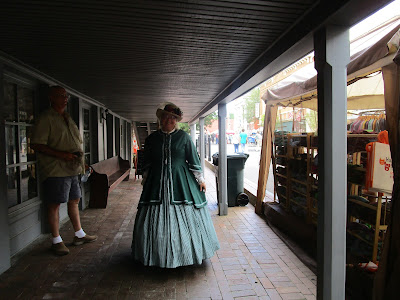When I planned my trip to Jonesborough I didn't know about Jonesborough Days. I'm happy I was there for that celebration. It's a nice time to visit, which I just hit by accident. More food is available in town during the festival. Additional tours and entertainment are provided during this time, including a parade. I was able to do some research before the courthouse closed on Friday for the festival.
I found some Holloway deeds at the courthouse. I am trying to prove Obedience, William McPike's wife was a Holloway. Unfortunately none of the McPike's witnessed or are mentioned in any deeds with the Holloways. William Holloway was on the road building crew with William McPike, building a road to the courthouse, in 1783. I was hoping to get more information on this William Holloway because his wife was named as Katherine. Unfortunately I haven't found any information on this couple, at least yet. The Washington County, Tennessee Holloways' origins are unknown?
Three historical tours were offered during Jonesborough Days. There were tours covering the town's history, and train station. I'll cover the Cemetery tour in my third post.
The 1886 Oak Hill School

Jonesborough Town Tour
Jonesborough was selected as site for a courthouse because of its central location for the population of the area. Washington County was the first county west of the mountains. Jonesborough was founded in 1779. Washington County was established in 1777. Area residents petitioned for a courthouse because the nearest one was over the mountains in North Carolina. This area was part of North Carolina at that time. North Carolina stretched from the eastern seaboard to the Mississippi. Towns grew up around the early courthouses, where local residents handled legal matters like filing wills and deeds.
The town was the birthplace of the state of Franklin.
Andrew Jackson lived for a time in a log cabin now on Main Street.
The trains brought in wrought iron and plates of glass for the expanding Main Street businesses. Steps were constructed in front of Main Street stores to make mounting horses and carriages easier for customers. May's was a fashionable ladies shop. You can still see the name plate in the door way.
One saloon was pointed out to us. It was closed after the city went dry.
The town contains many historic church buildings. All Protestant.
The civil war divided the town. One church Congregation split into two, because of a dispute over which side they supported. The Union supporters built a Northern style church to emphasize which side they supported. The Northern style church still stands out because of its dark gothic brick construction.
The town was a center for the abolitionist movement. The town still seems progressive.
The town is now a center for storytelling. A large storytelling festival takes place every year.
 |
| Clapboards cover an old log house |
The Chester Inn was built in 1797 and catered to stagecoach traffic. In early days their guests would have been mainly men, traveling for business. Women and families didn't travel often.
The Inn was restored based with furnishings, and recreated wallpaper from the 19th Century.
The 1906 Chuckey Train Station was moved to Jonesborough in order to restore and preserve it. It was getting ready to open to the public when I was there in late June/early July.
Railroad Tour
Tennessee was a late comer to train transportation. Johnson City's reason for being was as a railroad hub. Jonesborough had been a gateway to the west before the railway. Travelers west waited, someone times many months, for caravans west to form. Joneborough attracted merchants innkeepers, etc., catering to westward travel before railways. It was a thriving stagecoach stop with a large stagecoach inn built in the 1797 and still there, namely the Chester Inn.
The prosperous merchants of Jonesborough were responsible for adding the Joneborough connecting train line. They sensed the town would be bypassed without it.
When the train arrived in the 1850's it increased the wealth of the 1 percent living in town. Farmers and travelers did benefit from the railroad too, but the merchants and railroad investors did reap the largest benefits. The town required that the train to make at least one stop a day in town. The trains actually made many more stops as the town became a popular destination. The train brought the building materials for the mansions and stores in town. The town always prided itself on furnishing luxury goods to the frontier area.
The town actually provided more transportation options in Victorian days. Livery stables rented horses and carriages. You can't rent a car there now, and there is no public transportation. Amtrak may offer service in the future?
Freight trains still travel on the old line. They came through around midnight and 3 am when I checked the time. I like the sound of trains so I'm not complaining.
Andrew Jackson lodged for a short time in the 1788 Christopher Taylor log house.(below)
 |
| One of the earliest paintings of Jonesborough hangs in the Chester Inn Museum. |
Watercolor by Rebecca Chester 1810.
































No comments:
Post a Comment